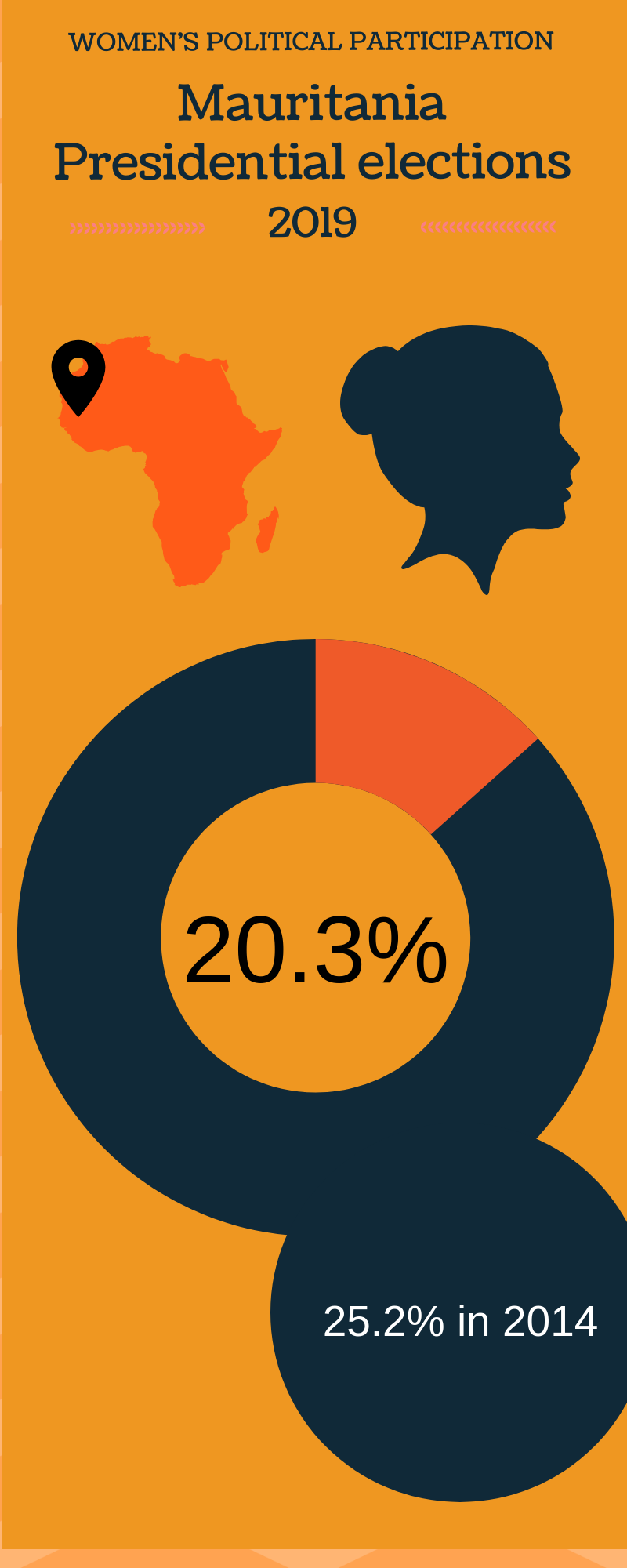By: Surbhi Mahajan
Mauritania went to polls on June 22nd, 2019 in the country’s first democratic transition of power since the West African country achieved independence in 1960 and since the 2008 coup. Mohamed Cheikh El-Ghazouani won an absolute majority (52% of the vote) in the first round. Opposition, including the well-known activist and anti-slavery campaigner, Biram Dah Abeid (also a candidate) claimed “balloting irregularities and the expulsion of representatives”.
In Mauritania, the president is elected by absolute majority vote through a two-round system and the prime Minister is appointed by the president. The president is responsible for guarding the constitution, representing the State, guarantees national independence and territorial integrity and has the power to dismiss and appoint judges despite independence of judiciary.
The 2006 Constitution guarantees women’s participation in political life. The government has also instituted several measures to ensure and increase the participation of women in the public and political space: an electoral law in 2006 that requires a minimum of 20% of all municipal council seats to be reserved for women. In 2012, the country reformed the electoral law to add 51 new seats to the National Assembly, of which 20 are solely reserved for women. In 2013, the government introduced financial incentives for political parties that nominate more women than required by the quota for national assembly seats.
Women’s Political Participation
Despite the above mentioned steps, women’s political participation remains restricted. 31 out of 147 seats in the National Assembly are held by women. In terms of women presence in political decision-making, one observes a noticeable lack of women in key leadership positions. Aicha Bint Jeddane (2003 and 2009) and Lalla Mariem Mint Moulaye Idriss (2014) have been the only two women to ever stand and contest elections. Women have maintained steady representation in parliament, only increasing slightly in 2014. In 2014, women held 25.2% of the seats in parliament. In 2014, women’s representation had increased to 13% and by 2015, it had more than doubled to 26.9%. Their participation peaked in 2017, with 30.8% of ministerial positions being occupied by women. As of 2019, women in parliament amount to 20.3%. For the 2019 election results, the data is not available yet.
In Mauritania, the Women’s Parliamentarian Caucus has been the driving force behind a number of proposals vis-à-vis gender-based violence. In 2016, the Caucus established agreement on actions that would be taken to eradicate gender based violence such as domestic violence and abuse, and included the proposal for new laws and legal frameworks. The development is significant as Mauritania does not have laws on domestic violence, rape and other forms of sexual violence.
Similarly, in 2016-17, a group of 12 women MPs from the Réseau des femmes parlementaires mauritaniennes (Network of Mauritanian Women Parliamentarians/REFPAM) organized a “caravan”, or outreach visits, to provinces in the country to engage local and religious leaders, and the general public on issues of women's land governance, women's participation in decision-making positions, and how to combat violence against women and girls.
As for the general landscape of women’s rights and gender equality in the country, Mauritania ratified the Convention on the Elimination of all Forms of Discrimination Against Women (CEDAW) in 2001. The country ratified the Maputo Protocol in 2005. It adopted a general code on children’s protection, which criminalizes female genital mutilation. In 2017, parliament adopted a law on reproductive health that recognized it to be a universal right but it also maintained the ban on abortion. At the same time, Mauritania’s laws on many issues such as divorce, child custody, and inheritance discriminate against women. The country ranks 147th out of 159 countries on the UNDP Gender Inequality Index. At the national level, there is no law to date that comprehensively addresses violence against women. According to the Human Rights Watch Report 2019 Mauritanian law does not adequately define the crime of rape and other forms of sexual assault, although a draft law on gender-based violence with more specific definitions was pending before parliament.
Conclusion
On the whole, a real lack of State’s commitment to address or rectify power inequities that have disadvantaged women all this while is evidently visible. Moreover, several other barriers continue to adversely affect women’s participation at any level. The limited access to education and employment, the lack of financial support for female political candidates, and the traditional stereotypes of women’s role in society with regard to men contribute to the low level of female political participation. For instance, in 2012, Aslamo Ould Sidi al-Mustafa issued a fatwa banning women from running for presidential elections, maintaining women may enter the race but it must be “just for fun.”

